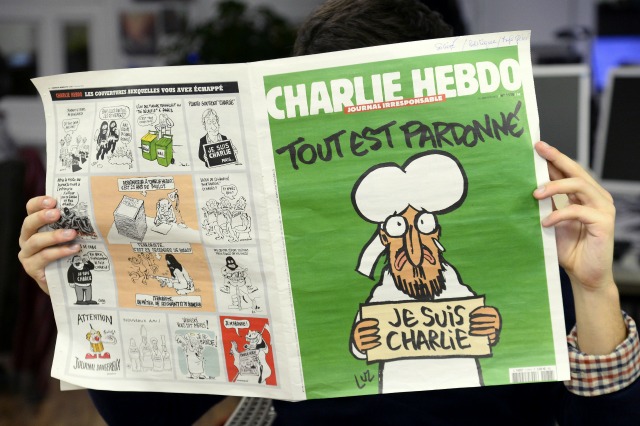
A defiant Charlie Hebdo cover of a crying Prophet Mohammed above the slogan ‘All is Forgiven’ is its first since many of its staff were slain in an attack that killed 12 people on January 7. This week’s post-attack edition of the French satirical magazine with the Prophet Muhammed on its cover will be made available in sixteen languages including English, Arabic and Turkish.
There are multiple lessons to learn from the terror attack on the offices of French satirical magazine Charlie Hebdo, but so far, many are electing to see this issue linearly.
As in, the notion that Islamic extremism is bad, and its most recent target, Charlie Hebdo, is a great symbol of the virtue of free speech. Yet it’s also perfectly reasonable to believe the attack was wrong, and dually think that the publication’s penchant for racist, inflammatory commentary about Muslims guised as “satire” is in bad taste. This is not cognitive dissonance; it’s common sense.
Alas, common sense is often not all that common.
SEE ALSO: Two Bombings, But Only One Garners Great Attention
Some members of the media are being willfully obtuse and exploiting an unfortunate event to promote even more racism. On a recent edition of Fox News’ Outnumbered, the co-hosts and guests used the strike that resulted in the deaths of 12 people to promote racial profiling – similar to what is too often employed in the United States. Fox News correspondent Shannon Bream, who covers the Supreme Court, suggested that certain skin tones are more typical of “bad guys” than others.
She and co-hosts Eric Bolling, Kennedy Montgomery and Harris Faulkner, who is Black and could have served as a voice of reason but opted not to, were discussing how the terrorist attacks in Paris relate to the militarization of law enforcement stateside.
Bream argued: “That’s my question about these guys, because, if we know they were speaking unaccented French and they had, you know, ski masks on, do we even know what color they were? What the tone of their skin was. I mean, what if they didn’t look like typical bad guys?”
The implication here is that “typical bad guys” bear a certain complexion. It was a sentiment echoed by Kennedy Montgomery who questioned whether or not profiling may be completely effective because “sometimes bad guys don’t look like bad guys.”
Bad comes in every form, only the browner you are, the more inclined you are to be perceived as “bad.”
And then there is the issue of Charlie Hebdo itself, which has been championed via its Je Suis Charlie campaign on social media, but has not bothered to honor any culpability it may have had on its attack.
Speaking with a French radio station on Monday, the magazine’s lawyer said the next issue of Charlie Hebdo will “naturally” include cartoons of Muhammad. Richard Malka explained to French Info radio, “We will not give in otherwise all this won’t have meant anything. Humor without self-deprecation isn’t humor. We mock ourselves, politicians, religions, it’s a state of mind you need to have…The Charlie state of mind is the right to blaspheme.”
Oh yes, the “we mock everyone” defense. They mock everyone, but Muslims – who are already treated as outliers in France – are lampooned with far more fervor. The issue will see three million copies published on Wednesday and be translated in 16 languages.
Three million copies, 16 languages, and one sad little stereotype continuing to be exploited.
This is something presented as if it should be celebrated, but it is nothing more of a continuation of a sad, racist practice.
Fortunately, at least some people in the press are understanding just how poor a routine all this is. Last week, New York Times executive editor Dean Baquet called an associate professor at the USC Annenberg School an “asshole” on Facebook in response to a professor who took a shot at him for not running Charlie Hebdo’s Muhammed cartoons.
In a previous interview with Politico, Baquet answered via email why he opted not to run the cartoons:
“We have a standard that is pretty simple. We don’t run things that are designed to gratuitously offend. That’s what the French cartoons were actually designed to do. That was their purpose, and for that publication it is a fine purpose. But it isn’t ours. So I had to decide whether it was so important to the story to show the drawings, important enough to drop the standard. And the answer was they were not. We could describe them. And anyone who wanted to see them could easily do so.”
In a follow up email, Baquet added:
“And obviously I don’t expect all to agree. But let’s not forget the Muslim family in Brooklyn who read us and is offended by any depiction of what he sees as his prophet. I don’t give a damn about the head of ISIS but I do care about that family and it is arrogant to ignore them.”
The difference between Baquet and the rest is that as someone of color, he knows what it’s like to be ostracized for who he is and mocked under some notion of “humor.” And Baquet, unlike the rest, is able to look outside himself and what this “humor” means to others – including his readers. It’s a shame so many refuse to.
Michael Arceneaux hails from Houston, lives in Harlem, and praises Beyoncé’s name wherever he goes. Follow him @youngsinick.
After The Charlie Hebdo Attacks, Racism Lives On [New Cover] was originally published on newsone.com




